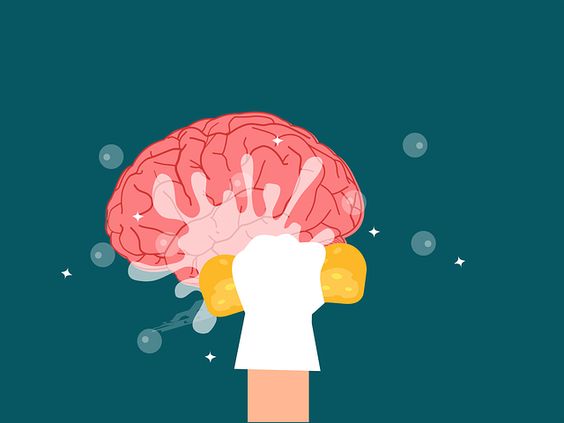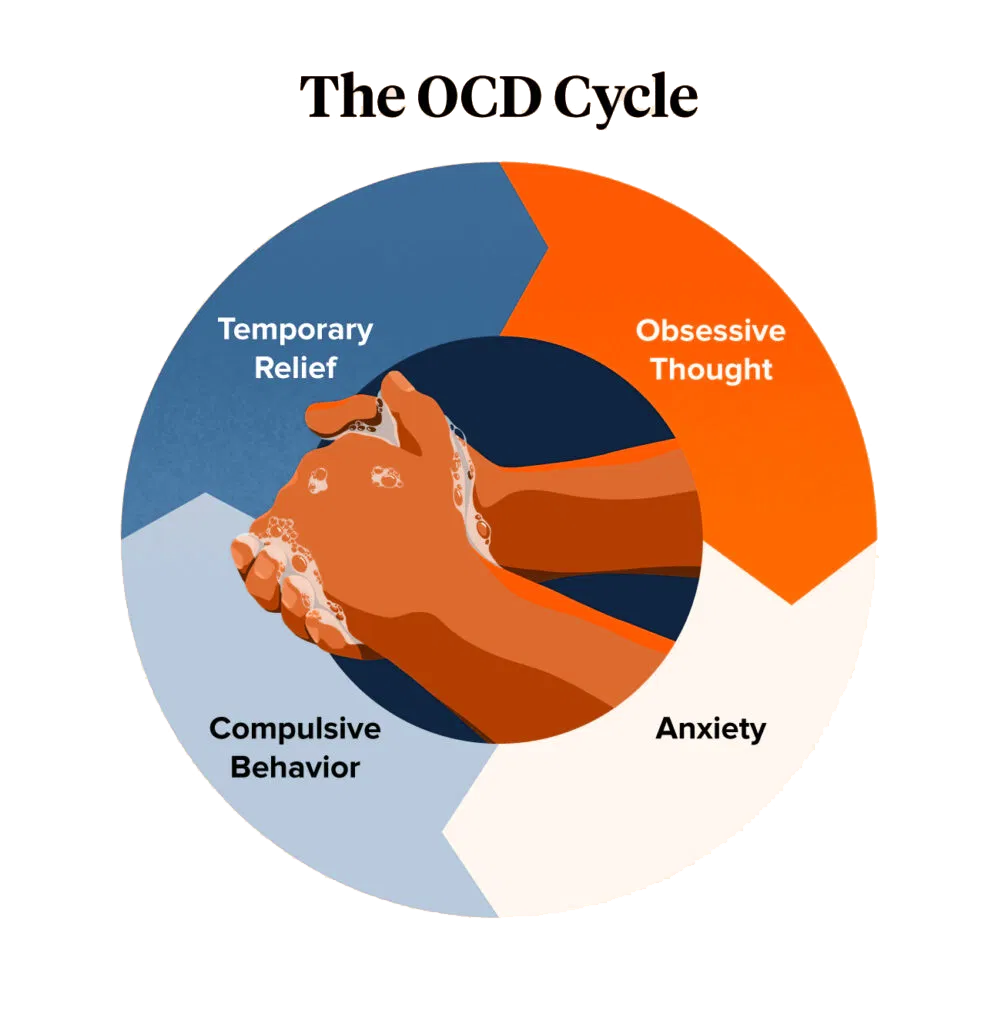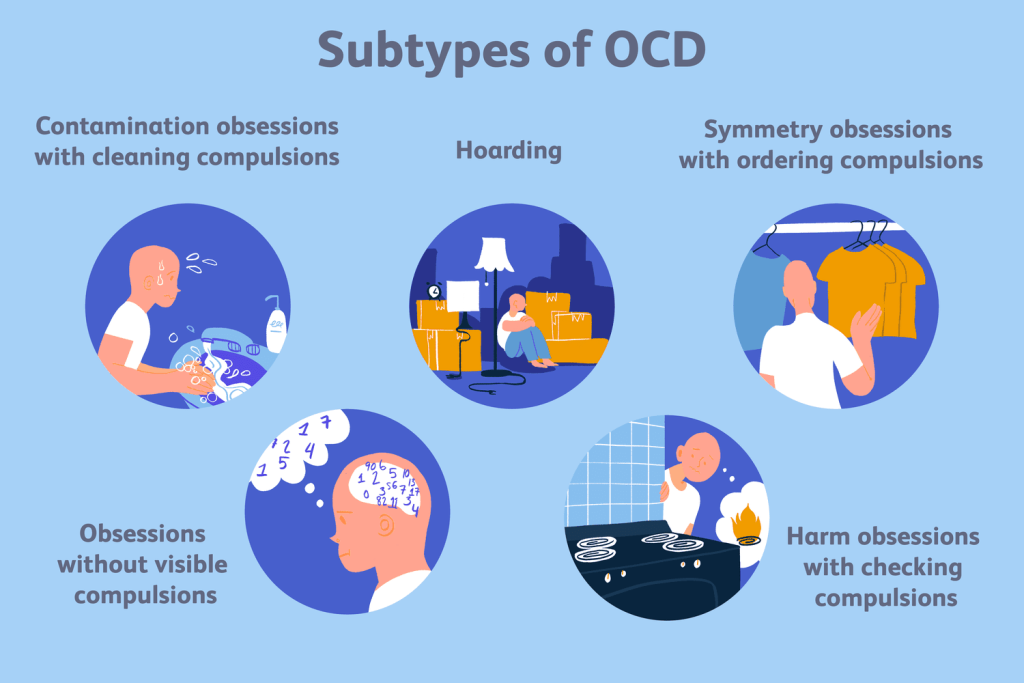

Home » Psychedelice » Psilocybin in The Treatment of Obsessive Compulsive Disorder
Obsessive Compulsive Disorder (OCD)
Obsessive-compulsive disorder (OCD) is a prevalent and persistent condition that significantly impacts an individual’s daily functioning. Based on cognitive and behavioral theories, the intrusive thoughts and repetitive behaviors associated with OCD can severely disrupt one’s daily activities, resulting in heightened levels of anxiety and distress. Unfortunately, this disorder often goes undiagnosed by medical professionals and lacks comprehensive treatment options.
Contents
Symptoms of Obsessive Compulsive Disorder
Obsessive Compulsive Disorder (OCD) is a psychological condition that manifests through the presence of obsessions and/or compulsions in an individual’s behavior and thoughts. These obsessions are characterized by repetitive and persistent images, impulses, or desires that are distressing and unwanted. In response to these obsessions, individuals with Obsessive Compulsive Disorder engage in specific actions or rituals in order to attain a sense of “perfection” or alleviate their anxiety. It has been observed that compulsive behaviors often precede the onset of obsessive thoughts, with the latter emerging as a secondary response.
The symptoms exhibited by individuals with OCD commonly revolve around various concerns. These may include excessive worries about contamination, leading to frequent washing or cleaning rituals. Additionally, individuals may experience persistent fears of causing harm to themselves or others, resulting in constant checking behaviors. Intrusive thoughts of an aggressive or sexual nature may also be present, alongside preoccupations with symmetry and counting. It is worth noting that Obsessive Compulsive Disorder (OCD) can be accompanied by a range of atypical symptoms, such as irregular heartbeats, heightened sensitivity to certain sounds (e.g., the sound of chewing food), intrusive mental imagery, or even the co-occurrence of bulimia nervosa. Another characteristic feature of individuals with OCD is their tendency to avoid engaging in certain activities or behaviors as a means of evading their obsessions.
Overall, the symptoms of Obsessive Compulsive Disorder (OCD) encompass a wide array of manifestations, all of which contribute to the distress and impairment experienced by individuals affected by this disorder.

Prevalence of Obsessive-Compulsive Disorder
The incidence of Obsessive Compulsive Disorder (OCD) is higher among women compared to men, despite the fact that the gender ratio remains relatively equal in clinical samples. The lifetime prevalence of this disorder is estimated to be around 2-3%. However, individuals with a family history of OCD and a higher number of first-degree relatives affected by the disorder have an increased likelihood of developing OCD, with the probability rising to 11%.
Symptoms of OCD typically emerge between the ages of 18 and 29, and the impact of the disorder tends to persist over a significant period of time. Interestingly, approximately 25% of men experience their initial symptoms before the age of 10.
In women, the onset of OCD often occurs during adolescence, although some women may experience a worsening of symptoms after giving birth.
Causes and Risk Factors of OCD
Obsessive compulsive disorder (OCD) is a complex condition that currently lacks a definitive cause. However, researchers have identified several factors that are believed to contribute to the development of OCD:
- Genetics: One significant factor is the hereditary nature of the disorder, as it often runs in families. Genetic variations that affect brain communication have been associated with an increased susceptibility to OCD.
- Life events: stressful or traumatic life events can act as triggers for OCD, particularly in individuals who have a genetic predisposition to the disorder. These events can disrupt the delicate balance of brain chemistry and contribute to the manifestation of OCD symptoms.
- Brain structure: studies have indicated that certain differences in brain structure and function may play a role in the development of OCD symptoms. For instance, hyperactivity in the prefrontal cortex, which is responsible for emotional regulation and decision-making, has been observed in individuals with OCD. These differences in brain activity and structure may contribute to the characteristic symptoms of OCD.
- Comorbidities: many individuals with OCD often experience co-occurring mental health conditions, such as attention deficit hyperactivity disorder (ADHD), depression, and anxiety.
- Age and gender
Different Types of OCD
Among the frequently encountered variations of OCD are:
Obsessive checking
Compulsive checking is a prevalent manifestation of Obsessive Compulsive Disorder (OCD). Individuals experiencing “obsessive checking” often exhibit excessive concern regarding the state of their appliances, the security of their doors and windows, or the potential misplacement of important items. This behavior is indicative of doubt, heightened anxiety, fear, and a perceived loss of control. Typically, individuals who engage in such checking behaviors are apprehensive about the possibility of an unfortunate incident resulting from their actions, whether intentional or unintentional. For instance, an individual with OCD may find themselves unable to leave their residence for an extended period due to the need to repeatedly verify the condition of the stove.
Order and symmetry
Individuals with Obsessive-Compulsive Disorder (OCD) often encounter persistent thoughts centered around the need for order and symmetry, as well as the compulsion to arrange things in a particular manner. The compulsive thoughts and behaviors associated with symmetry may involve the meticulous arrangement of objects, the rearrangement of furniture or picture frames until they appear aesthetically pleasing, or the repetitive counting of items to ensure an equal distribution. Consequently, these individuals tend to experience an overwhelming urge to excessively plan, meticulously manage their time, and meticulously organize their work.
Pollution
The fear of contamination is a prevalent obsessive thought experienced by individuals with OCD. Those who are afraid of germs and contamination often engage in compulsive behaviors such as excessive cleaning of surfaces and frequent hand-washing. They may also experience anxiety regarding their food and avoid touching objects that have been touched by others. These individuals dedicate a significant amount of time each day to washing as a response to these thoughts, despite not finding any enjoyment in this activity. Their fear of germs and pollution compels them to engage in excessive cleaning in order to alleviate the anxiety triggered by these obsessive thoughts.
Rumination or intrusive thoughts
Rumination is characterized by the presence of persistent, intrusive, and unwelcome thoughts revolving around a specific subject matter. These thoughts can encompass both mundane matters of daily life and distressing events from the past. For instance, an individual who has experienced trauma may find themselves unable to cease pondering over a distressing incident that occurred previously. Apart from being a symptom in itself, the act of ruminating can have detrimental effects on an individual’s overall well-being. This behavior has the potential to exacerbate or prolong feelings of depression, disrupt cognitive processes and emotional regulation, amplify anxiety levels, contribute to sleep disturbances and impulsive actions, as well as perpetuate chronic stress.

Treatment Options For Obsessive Compulsive Disorder
Effective interventions for Obsessive Compulsive Disorder (OCD) encompass a range of therapeutic approaches. These include pharmacotherapy employing selective serotonin reuptake inhibitors (SSRIs), psychotherapy such as cognitive-behavioral therapy (CBT), and in cases of treatment resistance, surgical interventions targeting the brain. Often, a combination of these treatments proves to be the most efficacious method in managing this condition. While it is important to note that OCD treatment does not offer a cure, it can significantly alleviate the levels of anxiety and depression experienced by individuals with OCD, thereby diminishing the extent to which the disorder dominates their daily lives. It is worth mentioning that certain individuals with OCD may require long-term, continuous, or more intensive treatment to effectively manage their symptoms.
The Necessity to Treat OCD Sufferers
Individuals who suffer from anxiety disorders such as OCD often experience persistent obsessional feelings and thoughts that can significantly impact their daily lives. These symptoms can interfere with relationships, employment, and basic functioning, making it crucial for patients to seek treatment and symptom control. While experimental treatments have been successful for many patients, a significant number continue to experience symptoms and impairments. As a result, there is a pressing need to investigate new and innovative treatment approaches, particularly for those with treatment-resistant OCD.
Obsessive-Compulsive Disorder and Psilocybin
Recent studies have focused on the use of Psilocybin, an active ingredient found in magic mushrooms, for the treatment of obsessive-compulsive disorder patients. Psilocybin has serotonergic properties and acts as an agonist of 5-HT1a, 5-HT2a and 5HT2c receptors, due to its chemical and structural similarity to the neurotransmitter serotonin. Controlled doses of psilocybin have been reported to be well tolerated and effective in relieving symptoms of obsessive-compulsive disorder. However, it is important to note that psilocybin consumption can lead to changes in perception, emotional awareness, and self-perception. Therefore, it is crucial that the administration of psilocybin is accompanied by the guidance and psychological support of an expert during and after administration. Factors such as goals, attitudes, mindsets, physical conditions, and the environment in which the drug is used can significantly impact the individual’s experience.
Psilocybin For The OCD Treatment
Psilocybin has been found to be effective in alleviating Obsessive Compulsive Disorder symptoms through various mechanisms. Its interaction with different serotonin receptors in the brain can lead to changes in the activity of these receptors, resulting in a reduction of obsessive-compulsive disorder symptoms.
Specifically, psilocybin has been shown to eliminate concerns related to repetitive thoughts, impulses, or mental images that underlie obsessions. This can be measured by assessing the error-related negativity (ERN) brain wave pattern, which is typically increased in individuals with OCD. Furthermore, research has demonstrated that psilocybin can alter the functional communication between different brain regions, further contributing to its therapeutic effects.
The default mode network (DMN) of the brain is responsible for various cognitive functions, such as self-referential thinking, imagination, problem-solving, memory retrieval, and emotional processing. This network exhibits high levels of activity during periods of introspection when the individual is not engaged in external tasks. In individuals with obsessive-compulsive disorder (OCD), recent research has revealed heightened communication and connectivity between different regions of the DMN. This may be attributed to the increased frequency of mental activities that involve self-reflection, self-evaluation, and emotional processing in individuals with OCD.
Psilocybin treatment has been found to have a profound impact on the functional connections within the default mode network (DMN) structures, resulting in a notable decrease in symptoms associated with obsessive compulsive disorder (OCD). This treatment is believed to facilitate the development of insights and attitudes that are commonly achieved through the process of psychotherapy. Furthermore, mind-altering experiences, including mystical experiences, have been shown to have positive effects on health, stress reduction, and the alleviation of OCD symptoms.
It is important to emphasize that the use of psilocybin treatment should be conducted in a supportive environment under the guidance of a trained professional. When administered in this manner, psilocybin treatment not only proves to be safe but also demonstrates the potential for rapid and significant reduction in overall Obsessive Compulsive Disorder symptoms, leading to an overall enhancement in an individual’s quality of life. Consequently, psilocybin is now regarded as a groundbreaking approach in the treatment of OCD, as well as other mental health conditions such as depression and addiction.

